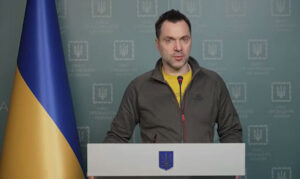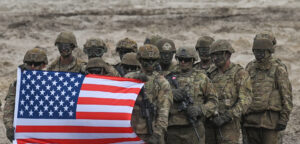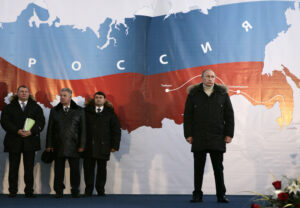Two years ago, it momentarily looked like the Ukraine war might be concluded as soon as it had begun. As Zelenskyy’s former advisor Oleksiy Arestovych revealed in his interview with UnHerd, when he returned from the Istanbul peace negotiations with Russia in April 2022, his team cracked open the champagne to celebrate. The talks had been “completely successful”, he said, with 90% of contentious issues resolved in a manner broadly advantageous to Ukraine. All that was left was for Zelenskyy and Putin to meet in person a few days later to hammer out the final size of the post-war Ukrainian army, and ink the final deal. And then everything changed: “Something changed in Zelenskyy absolutely during this [period]. And historians have to find the answer to what happened.”
The events of those fateful five days are still obscure and controversial, with two different narratives offered. In the first, Zelenskyy’s visit to the scene of the Kyiv suburb of Bucha, where occupying Russian troops had carried out grisly atrocities against captive Ukrainian civilians, hardened the president’s resolve to keep fighting, while making peace talks politically untenable for the enraged Ukrainian public. “The President was shocked about Bucha, all of us were shocked about Bucha,” says Arestovych. “He started to think how could he provide negotiations and meet Putin directly after this? His face completely changed when he went to Bucha and saw what had happened.”
But in the second narrative — made much of by Russia propaganda, though first floated by the Ukrainian press, and latterly by former Israeli prime minister Naftali Bennett and Ukraine’s former Deputy Foreign Minister David Arakhamia who were both privy to the negotiations — Boris Johnson’s unexpected trip to Kyiv somehow changed the war’s course. “A lot of people say Prime Minister Johnson came to Kyiv and declined these direct negotiations with Russia,” Arestovych volunteers, “But I don’t know exactly: is it true or false? This is a problem. Yes, yes, he came to Kyiv but nobody knows except I think Mr Zelenskyy and Boris Johnson himself what they spoke about.” Yet whatever the sequence of events, Ukraine broke off peace talks and the war resumed, with vast casualty numbers on both sides as a result.
Could things have worked out differently? In hindsight, the path not taken often looks more appealing than the actual course of events. A passage from Thucydides — like Arestovych, a strategic insider later exiled from his country by its turbulent democratic politics — highlights the uncertainties inherent in whether to commit to war or pursue an unsatisfactory peace. In 425 BC, the greatest military power in Greece, Sparta, found its elite troops unexpectedly humbled by their Athenian rivals at the Battle of Pylos. A Spartan delegation rushed to make terms, warning the Athenians not to let the arrogance of victory cloud their judgment. For “you are now in a position where you can turn your present good fortune to good use, keeping what you hold and gaining honour and reputation besides”, the Spartan envoys declared: “Thus you will avoid the mistake so often made by those who meet with some extraordinary piece of good luck and then go on pressing forward in the hope of more still, because of the very unexpectedness of their first success.”
War is, after all, an uncertain business, the Spartans warned, in a speech that could easily be placed in Russian mouths: “Our resources are the same as ever; we simply miscalculated them, and this is a mistake that may be made by everyone.” In concluding a peace agreement, the Spartans urged, the Athenians could “avoid what may happen later, if you fail to agree with us and afterwards, as is quite possible, suffer a defeat.” But the Athenians, swayed by the hawkish demagogue Cleon, rejected the offer: after decades of gruelling and devastating war, and the total destruction of entire armies, the result was total Athenian defeat, and the city’s incorporation into the Spartan imperial system.
Perhaps too much was staked on Ukraine’s 2023 offensive, by both Ukraine and its Western backers. Though US intelligence officials warned the offensive would likely fall far short of expectations, American strategy nevertheless centred on enabling Ukraine to make battlefield gains so significant that Kyiv could re-enter peace negotiations with Russia from a position of strength. But, delayed from spring into summer by slow weapons deliveries and the failed defence of Bakhmut, a costly distraction for Kyiv, Ukrainian forces barely made any headway against the Russian fortifications. The offensive was a spectacular failure, and the Russian regime shifted from its mode of panic and internal turmoil in early summer to a new mood of overbearing confidence in the war’s final outcome. In retrospect, the growing difficulties on the battlefield seem to bear out America’s then-Defence Secretary Mark Milley’s warning that the optimum time for negotiations was the winter of 2022, while Russia was on the back foot.
Now, as Ukraine steels itself for its third year of war, peace has never seemed further away. On the war’s current trajectory, there is no incentive for Russia to enter negotiations: Ukrainians must hope that over the coming year, their newly constructed fortifications will batter the Russian army so effectively, just as the Surovikin Line mauled their own offensive, that Putin will reassess his prospects of victory, setting the stage for meaningful talks. While far short of the expansive aims of the war’s earlier stages, it is not a terrible strategy, as I suggested back in the summer. Despite Moscow’s vast advantage in men and industrial production, Russian gains remain costly and incrementally slow: eventually the pain Ukraine inflicts may come to outweigh, in Putin’s mind, the modest territorial gains currently being achieved.
For sympathetic but realistic analysts, like the Ukrainian strategist Mykola Bielieskov or the RUSI’s Jack Watling, Ukraine’s best outcome at this stage would be to survive 2024, while marshalling resources for another offensive in 2025, once Russia’s own offensive capacity has been dented by another full year of costly assaults. As Bielieskov observes, “While some observers will inevitably see this stance as pessimistic or even defeatist, it reflects the current realities of the war and represents the most plausible pathway to future success.” The worst-case scenario, Watling notes elsewhere, would be “an immediate cut-off of U.S. aid resulting in the slow deterioration of Ukrainian forces over 2024 and a collapse in 2025 as Russia expands the active front”. This outcome, it must be noted, echoes the Russian defence minister Sergei Shoigu’s prediction that on current trends, Moscow will emerge victorious in 2025.
Over 2024 then, both sides will aim to degrade each other’s forces as much as possible: the staggering casualty rates of the past year look certain to escalate even further. With an ability to strike Ukraine’s home front in a way Kyiv cannot match, Russian forces will also escalate their current campaign against Ukraine’s domestic power infrastructure, aiming to sap civilian will to continue the war. Yet for Arestovych himself, a critic of Zelenskyy’s overall strategy, Ukraine’s situation, while bad, is not yet desperate, telling UnHerd that even in the worst-case scenario: “I think it will be not immediate collapse, on the frontline or interior Ukrainian situation. I think it will be getting worse and worse, for half of the year probably.” In such circumstances, more expansive definitions of victory ought to be parked, at least for now. “If we really get into realistic policy, we kind of have to say there’s no way to liberate Donbas within five or 10 years for us,” says Arestovych, “The only goal we have right now is to not give Russia the ability to seize more territory of Ukraine.”
With the merciless clarity of hindsight, the uncertain prospects of eventual victory and the challenges to be endured over the coming year will revive debate over whether the collapsed peace negotiations of 2022 were a missed opportunity for Ukraine. Should Kyiv have swallowed the bitterness created by Bucha, and accepted Russia’s less onerous terms back at the beginning of the war? Could Putin have been trusted to stand by the peace deal, and not merely amass resources for a second, meticulously planned invasion some years later? Again, Thucydides may afford a useful parallel. For the classicist and neoconservative pundit Donald Kagan, writing, ironically enough, at the height of American hubris in 2003, the Athenian spurning of the Spartan peace offer was, in the circumstances, not unreasonable. “The Athenians must have understood that… Sparta could resume the war any time it pleased,” Kagan observes, and “had good reason to want more than merely the promise of Spartan good will in the future”. Just as Ukrainian opponents of a peace deal with Russia warned in 2022: “Why should belligerence not take the upper hand again once it was safe?”
Just the same considerations are in play when assessing Ukraine’s path to constructive peace negotiations over the coming year. That the war will end in a peace deal rather than total battlefield victory now looks the best achievable outcome for Ukraine. What remains to be decided is when, and what peace terms are both politically acceptable and militarily achievable. For Arestovych, Putin’s timeline is clear: “I completely understand Mr. Putin’s goal [is] to get into the negotiations with us from the very strongest position. They need the weakest position for Ukraine, and the strongest position for Russia, for August or September.” Writing for the isolationist Quincy Institute think tank, the strategic analyst Anatol Lieven echoes the Spartan envoys at Pylos in declaring that “Washington and Kyiv both have a strong incentive to open peace talks while we still retain significant leverage; for if we wait, the terms that we will get in the future are likely to be much worse for Ukraine and much more humiliating for the West.”
Yet echoing Kagan’s hawkishness on Athens’ behalf, the neoconservative Institute for the Study of War think tank (founded, in one of the strange rhymes of American public life, by his daughter-in-law Kimberley Kagan) rejects the idea, floated by the New York Times to the horror of Ukraine’s online supporters, that there is any current prospect for meaningful talks, citing bellicose official Russian statements to the contrary and Putin’s general untrustworthiness. Similarly, as the Russia analyst Sam Greene observes, there is a likely incentive for Putin to enter into insincere peace negotiations now, on the basis that the Western will for them to succeed will incline Ukraine’s external backers to taper off military support both as a sign of good faith and a means of pressure on Kyiv. As Greene notes: “The problem is this: For the West, negotiations are a means of ending the war. For Russia, they are a means of winning it,” allowing Putin to drag out the fighting on favourable terms while increasing his leverage on the battlefield.
Each argument, for and against, is both rational and credible: sometimes, all the options are bad. Yet either way, though reviled as defeatism by Ukraine’s more excitable foreign cheerleaders over the past year — as dynamic future historians will debate — the median policy of dogged Ukrainian defence leading to peace negotiations has now quietly become the Biden administration’s preferred strategy for resolving the conflict. Dependent until now on a supply of Western arms that is drying up, to survive the difficult year ahead Ukraine will be forced to rely on its own industrial resources to a far greater degree than it has achieved so far. This will not be an easy task given Russia’s growing effectiveness at striking deep within Ukraine from the air. Uncertain of the duration and extent of Western support, increasingly divided over strategy and struggling to raise the vast reserves of manpower necessary to hold the line, the coming year will be fraught with challenges for Kyiv and its Western backers.
Negotiations at some point will be necessary — yet whether the best time for them has already passed, or is yet to come, is a question as unanswerable as it is urgent. For centuries, future historians will also debate the twists and turns that led Europe to this point. Unless a basis for a constructive peace is found, one empire or another will be humbled in Ukraine: which one that will be is still the question to be decided. As the Athenian delegates vainly trying to dissuade the Spartans from declaring war observed: “The longer a war lasts, the more things tend to depend on accidents. Neither you nor we can see into them: We have to abide their outcome in the dark.” In 2024, just as in 2022, we stand at a fateful crossroads in the dark. It is only over the coming year that history’s judgment on the path taken will begin to assume its final form.
Disclaimer
Some of the posts we share are controversial and we do not necessarily agree with them in the whole extend. Sometimes we agree with the content or part of it but we do not agree with the narration or language. Nevertheless we find them somehow interesting, valuable and/or informative or we share them, because we strongly believe in freedom of speech, free press and journalism. We strongly encourage you to have a critical approach to all the content, do your own research and analysis to build your own opinion.
We would be glad to have your feedback.
Source: UnHerd Read the original article here: https://unherd.com/





